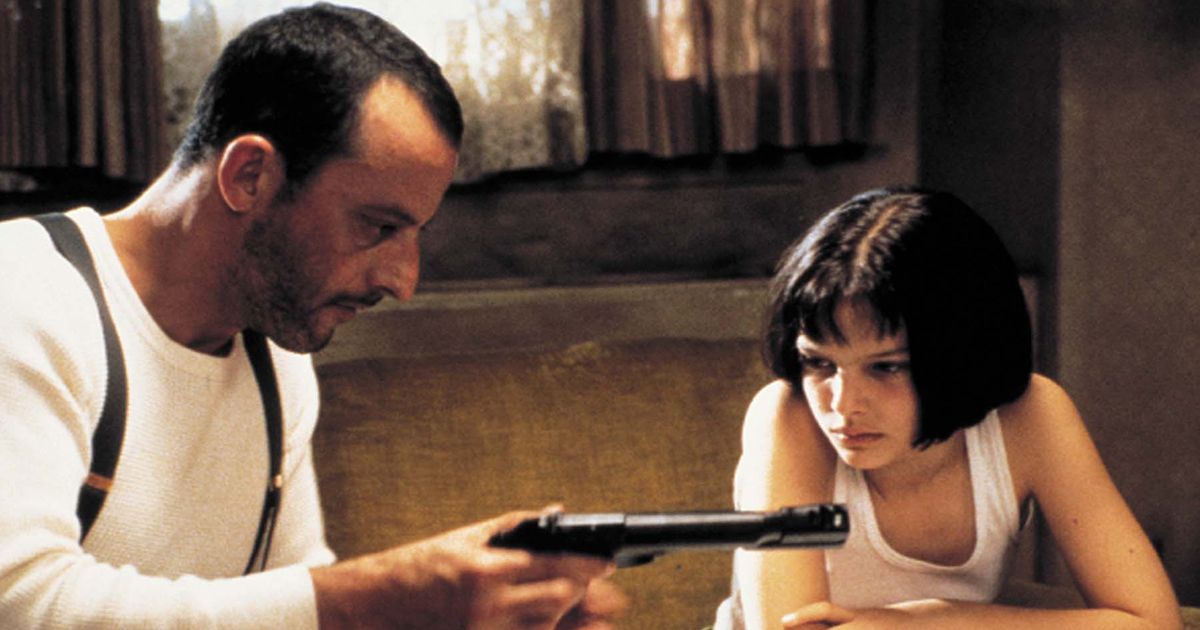Every middle child growing up can attest to the unfair treatment they were dealt. The little escape from family drama, being the scapegoat at the sound of blame, and the constant fear and strife of being one's self. Never mind having one's voice heard or wanting something different, the middle child was left to his or her own devices. The middle child had to find his or her own personal peace in the midst of domestic disorder. This is the story of Mathilda. Not to be confused with Matilda, the girl with X-Men-like psychic powers from a dysfunctional family, Roald Dahl's beloved children's book.
Mathilda Lando (Natalie Portman) is a twelve-year-old who also lives with a dysfunctional family, trying to survive her upbringing in her cramped, decrepit New York apartment. Meanwhile, an Italian immigrant becomes an assassin (Jean Reno), stalwart and pithy, living off the hit list of Mafia boss, Tony (Danny Aiello of The Godfather: Part II fame), and using Guido's Restaurant as a front. Back at the apartment, viewers discover Léon and Mathilda are neighbors whose paths cross and change in an unforgettable way; no sequel can replicate.
Love in a Hopeless Place
Léon: The Professional is a '90s staple, directed by Luc Besson, known best as an action film. What audiences gloss over is the awkward relationship between adolescence and adulthood. Unbeknownst to her, Mathilda must take a dreaded walk from a trip to the grocery store back to her apartment, where she realizes her family has been gunned down by duplicitous DEA agent Norman Stansfield (Gary Oldman). She instead walks to the apartment of the coat-and-beanie-wearing, round-spectacled, thin-and-tall-as-a-signpost man, hoping his door has not sealed her fate.
The moment Léon opens the door is the moment this movie deserved an Oscar. Natalie Portman, in her first fantastic role, conveys shock, restraint, fear, desperation, and resilience, all in one scene. Jean Reno's character has a silent but deadly aura that hides a tortured past. The latter, ironically, was hidden from American audiences, causing mixed feelings from viewers about the love Mathilda has for Léon and vice versa. In another irony, this love-and-be-loved hole in Léon's life sealed this hitman's fate.
No Women, No Kids
A milk-drinking, suspenders-wearing, plant-loving Italian hitman adopts a young girl after her dysfunctional family is murdered by a crooked cop and makes her his protégé, teaching her the ways of the hitman. What more could one ask for? Mathilda had to improvise her life, juggling the desire to remain a kid (influenced by her little brother) and turning into a young woman (influenced by her older sister). The version of this movie that was too risqué for American theaters was the International Version, boasting a confused reversal of romantic love and fatherly love. What made audiences uncomfortable was Mathilda's admittance to being in love, calling Léon her "lover" to the hotel receptionist (George Martin), a feeling she cannot completely explain.
Rather than giving the young girl any benefit of the doubt, they framed Léon as a pedophile instead. It is clear that Léon has no sexual intentions; his Stoic and slow responses to emotions are more calculated than physical. In the International Version, Léon shares the tragic story of his first love and how he never loved again. This was lost on moviegoers, so the Lolita parallel and pedophilic scare drummed up was unfounded, albeit understandable. Natalie Portman's parents also wanted changes to the script as part of her contract. They were the reason Mathilda quits smoking, for example. Despite these edits, the perverse relationship still makes itself known as it marks the difficult transition and connection from sexuality to identity. A dynamic that does not cross the line, but definitely walks the line.
Luc Besson's Movie is a Masterful Mirror.png)
Mathilda is lonely, misunderstood, and ambitious. Does revenge count as ambitious? Maybe not, but everyone has had the incriminating, venting, anger-filled thought. Gary Oldman's character is the anti-Jim Gordon, who you love to hate. He is the master manipulator and embodiment of two-faced power plays. And in the middle of it all, the ultimate middleman, Jean Reno as Léon, humble, and mild-mannered on the surface, who carries a dark will to live. Entrapped by the violence, his emotions are repressed until Mathilda enters his life. Leon is able to be a father figure for Mathilda, teaching her how to defend herself, face hardships, and grow as a disciplined and discerning person. By the film's end, everyone falls in love with the assassin-turned-good samaritan. By everyone, I mean, EVERYONE!
The closest sequel to Léon: The Professional is Luc Besson's Anna (2019). The director has filmed other strong female protagonists in justifiable grey areas, like spiritual predecessor, La Femme Nikita (1990) (Point of No Return (1993) in America), and Lucy (2014), while movies like Salt (2010) and Hanna (2011) attempted the same. Jean Reno starred in The Doorman (2020) as a villain in another New York apartment building, but they cannot compete with Mathilda and Léon.
Luc Besson's cult classic stands out as an unwavering stare and gait at humanity's duality. The interplay between good and evil exists in us all. It is a slippery slope, a steep climb, and a vulnerable standstill; moments in our lives we have to face, replace, and reinvent to move forward. When watching Léon: The Professional, the motif of how we can grow up too fast, but slow enough to know our roots, helps us grow and plant a seed of change for the better. This is from Mathilda.


.jpg)
.jpg)